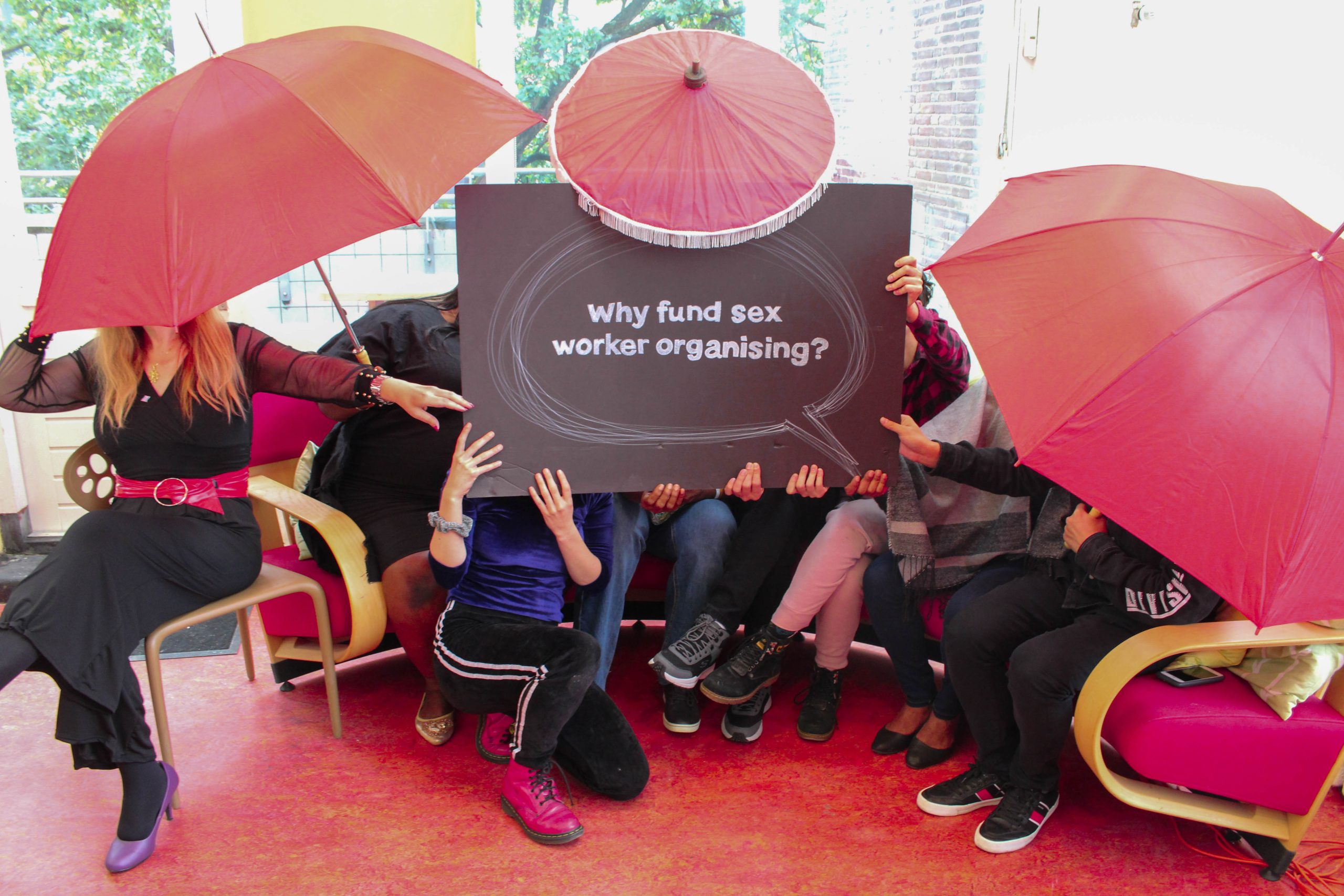Crossposted from OpenDemocracy
If money is power, then control over money has to be democratized. What if grants to social movements of sex workers were distributed by sex workers themselves? This is the eighth article in our series on money and social transformation.

‘Money is power’ as the old saying goes, so how do you change the power dynamics surrounding money in an NGO or a foundation? The obvious place to start is by introducing more democracy: for example, what if grants to build the social movements of sex workers were distributed by sex workers themselves? That’s the vision of the Red Umbrella Fund.
“We are the ones whose lives are affected” said one sex worker to me recently (who prefers to remain anonymous), “and we need to be the ones making decisions about how to better our lives. I think it’s helpful to have sex workers making funding decisions, because we understand which projects or groups will really be effective towards positive change.”
The Red Umbrella Fund is one of a new wave of organisations that put people who have experienced oppression in the driving seat of funding organisations, rather than relying on elites who claim to act on their behalf. Other examples include FRIDA, which funds young feminist activists globally, and the Disability Rights Fund, which supports organisations of persons with disabilities in the Global South.
The idea for the Fund emerged during a seminar in 2008, when sex worker representatives, human rights funders, and other advocates gathered to discuss sex work and human trafficking. One of the meeting’s recommendations was to increase support to sex worker groups and their networks. A 2006 report by the Open Society Foundations had found that in 2005, the five largest funders of these groups contributed less than $1 million combined.
According to figures collected in 2010, most sex worker organisations are small, with annual budgets of less than $41,000. In Southern Africa that figure is even smaller, at less than $9,000 a year. Most groups depend on short-term project funding, with a large portion of the budget earmarked for HIV-related services like condom distribution. Costs related to long-term organisational development and coordination are often ignored. Yet groups working within social movements need access to this kind of funding in order to organise, build capacity, and advocate for change.
The Red Umbrella Fund was founded in 2012 and is the only global sex worker-led funding institution in the world. It is governed by an International Steering Committee that includes four contributing foundations, and a majority representation from the sex workers’ rights movement. Members serve two-year terms on the committee, which is based at Mama Cash. The Red Umbrella Fund’s mission is to strengthen and sustain the sex workers’ rights movement around the world by providing and catalysing funding.
Why the ‘red umbrella?’ Red umbrellas were first used by sex workers in Italy in 2001 in a march to draw attention to their working conditions and violations of their rights. Since then they have become an important unifying symbol for the sex workers’ rights movement. The European network of sex workers considers the red umbrella a symbol of both beauty (the colour red) and resistance to discrimination (the umbrella).
Working in the spirit of the old social movement mantra, ‘nothing about us, without us’, sex workers stand at the heart of every key decision that Red Umbrella makes.
How does this work?
In 2013, the Fund received 400 funding proposals from 80 countries. While the Fund’s staff do an initial screening, all decisions are made by a peer review panel consisting of at least 80 per cent of people who are current or former sex workers. The remaining 20 per cent are allies with various forms of expertise. In 2013, the Red Umbrella Fund made 25 grants totalling 462,500 Euros.
Tracey Tully is a former sex worker who was raised in Australia and is now the Co-coordinator for the Asia Pacific Network of Sex Workers in Thailand. She was part of the latest peer review panel:
“The beauty of having a committee of sex workers coming together was the fact that there was representation from all regions of the world. We already know that the needs of sex workers are different from place to place, but assembling sex workers to discuss the issues during the determinations brought a modicum of clarity to the proceedings.”
The composition of sex worker representatives in this process is important, as is the support that’s provided to them so that they can participate effectively. The selection process takes all forms of diversity into account, ensuring the inclusion, not only of women, but also of men and trans sex workers who are often forgotten.
The grant selection process also aims to ensure that representatives from the sex workers’ rights movements complement each other’s skills and experience. For example, some are more experienced with local-level organizing, while others are more involved in activism at the national and international levels.
Why is direct participation in decision-making so important? Tracey explains:
“I think the difficulty of policy officers and programming people working in isolation is possibly why so much sex worker funding is channelled into bad programming. This is how most proposals are determined, in offices far removed from the grassroots and the populations they serve. Proposals that are technically perfect can contain holes, in particular the potential for human rights violations against sex workers that are invisible to the untrained or inexperienced eye.
As an activist, I know how difficult it is for sex workers to obtain funding. There will continue to be impediments to the empowerment of sex workers so long as people who are detached from the context about which they make judgements are making the critical decisions. This fund exists for sex workers to create and run their own networks and to drive their own agendas within their own organisations. Self-determination is the key to what makes sex worker programming successful.”
In reversing the power dynamics of decision-making over money, the Red Umbrella Fund and other funds like it challenge the practice of accountability in NGOs and foundations.
Funders expect their grantees to be accountable to them, but it’s equally important to ensure that funders are accountable to the groups they support.
As the coordinator responsible for the daily management of the Fund, I know how our peer-led governance structure re-orientates our accountability to the movement we support. Where other funders might take years to evaluate and adjust their grant-making practices and tools, sex worker activists in the Red Umbrella Fund show little patience for bureaucratic arguments that delay improvements in our work. They are right. If we know how to do something better, why wait?
I receive instant feedback when our procedures fail or when communication isn’t clear, because the sex worker community is involved directly. For example, we changed our selection criteria to ensure that underfunded but experienced groups and networks that support newer organisations with their knowledge, experience and partnership could apply.
We are constantly questioned by sex workers about decision-making processes and priorities, as well as the final selection of grantees. This keeps us ‘on our toes,’ and pushes us to improve our transparency, documentation and communications.
A movement so short of money doesn’t let a penny go to waste.
Involving the users of funding in decisions over money goes against the predominant orthodoxy in philanthropy, with its emphasis on ‘value for money’ and ‘efficiency of impact.’ But involving those who are most affected by discrimination and prejudice actually strengthens success in each of these areas.
Unlike traditional models of grant-making in an NGO or a foundation, the Red Umbrella Fund helped to build the capacity and leadership of the sex workers’ rights movement even before the first Euro was granted, because sex workers themselves played such a key role in establishing the institution.
As one of the sex workers on our peer review panel told me, the “bottom line is this: it’s our bodies, our lives, and we should be at the front of all decisions that affect us.”
By Nadia van der Linde, Red Umbrella Fund


